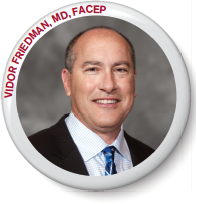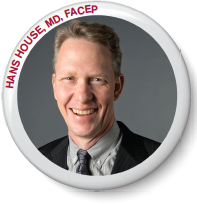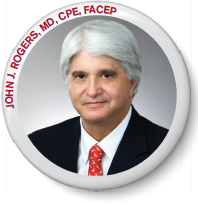
Each October at ACEP’s annual Council meeting, the ACEP Council elects new leaders for the College. The Council, which represents all 53 chapters, 37 sections of membership, the Association of Academic Chairs in Emergency Medicine, the Council of Emergency Medicine Residency Directors, the Emergency Medicine Residents’ Association, and the Society for Academic Emergency Medicine, will elect the College’s President-Elect, four members to the ACEP Board of Directors, and the Council Vice Speaker. This month, we’ll meet the President-Elect candidates. In September, we’ll meet the Board of Directors candidates, and in October, we’ll meet the Council Officer candidates.
Explore This Issue
ACEP Now: Vol 36 – No 08 – August 2017Vidor Friedman, MD, FACEP (Florida)
 Current Professional Positions: Florida Emergency Physicians (FEP) of TeamHealth, Maitland
Current Professional Positions: Florida Emergency Physicians (FEP) of TeamHealth, Maitland
Internships and Residency: Emergency medicine residency, Michigan State University, East Lansing
Medical Degree: MD, University of Cincinnati College of Medicine (1986)
Candidate Response
Over the past five years, the President’s activities have focused on being the Chief Advocacy Officer for the College. This advocacy can be seen both in the political realm and in increased collaborative efforts with other entities in the health care space. Alliances with other specialties within the house of medicine led to the recent American Medical Association resolutions regarding out-of-network care and the opioid crises. Partnerships with organizations, including the West Health Foundation and the John A. Hartford Foundation, have supported our engagement in geriatric emergency medicine. In all of these efforts, the President of the College has been both content expert and public spokesperson for the College.
I have been a staunch advocate for emergency medicine for over 15 years, this is not new territory for me. As Governmental Affairs Chair for the Florida College of Emergency Physicians, and as President of the chapter, I led our advocacy efforts in Florida for almost a decade. I was the Federal Governmental Affairs Committee Chair during the Affordable Care Act deliberations, and was one of the architects behind the creation of the Emergency Medicine Action Fund (EMAF).
“I would work to improve the feedback loop from our chapter leadership and the Council by engaging our social media platforms and enhancing our survey feedback tools. This will help to align ACEP’s initiatives with our members’ priorities.” —Vidor Friedman, MD, FACEP
EMAF was created to increase resources for regulatory lobbying in response to the passage of the ACA and is essential as we face current and future health care reform initiatives. The increased collaboration from having diverse elements from within our community all sitting at the table and discussing our collective needs was as important a win to me as the success that EMAF has become.
As President, I would work to improve the feedback loop from our chapter leadership and the Council by engaging our social media platforms and enhancing our survey feedback tools. This will help to align ACEP’s initiatives with our members’ priorities. As your President and Chief Advocacy Officer, I will ensure that those priorities become results.
Hans House, MD, FACEP (Iowa)
 Current Professional Positions: Professor, emergency medicine, University of Iowa; vice chair for education, Department of Emergency Medicine, University of Iowa, Iowa City
Current Professional Positions: Professor, emergency medicine, University of Iowa; vice chair for education, Department of Emergency Medicine, University of Iowa, Iowa City
Internships and Residency: Combined internal medicine–emergency medicine residency, Olive View–UCLA Medical Center, Sylmar, California
Medical Degree: MD, University of Southern California (1997)
Candidate Response
The ACEP President is the spokesperson of the college. Over the last five years, ACEP’s media relations team has done an incredible job of increasing the number of on-camera media interviews. The Washington, D.C., office has greatly increased the opportunities for in-person small group meetings with politicians. As the face and voice of the College, the President must be an articulate and effective public speaker. I am an experienced, dynamic, and charismatic speaker who can convey the energy and enthusiasm of our diverse specialty.
As President, I will focus on reducing burnout in our members by addressing system changes in our workplace. As work environments, emergency departments are dangerously prone to normalizing conditions that radically deviate from what is acceptable. The constant frustrations generated by enduring the sense of powerlessness and dysfunction in today’s health care system are cutting short the careers of brilliant and caring physicians. Panagioti et al found that interventions that focus on system changes are almost twice as effective at reducing burnout than interventions that only address the individual physician.1 In other words, no amount of yoga and meditation is going to help until the underlying system frustrations are addressed.
“As work environments, emergency departments are dangerously prone to normalizing conditions that radically deviate from what is acceptable. The constant frustrations generated by enduring the sense of powerlessness and dysfunction in today’s health care system are cutting short the careers of brilliant and caring physicians. ” —Hans House, MD, FACEP
As President, I would direct ACEP to aggressively target system changes, even on a local level. Important drivers of burnout that I would address include the boarding of inpatients (especially mental health patients), merit badge requirements for hospital credentialing, improving the maintenance of certification process, and encouraging stability in hospital contracts. Furthermore, our members can maximize control over their workplace by owning it themselves, so I embrace the trend toward opening freestanding emergency centers. These centers revive career satisfaction, provide ideal access to care for patients, and bring sorely needed disruptive change to an entrenched and dysfunctional system.
Reference
- Panagioti M, Panagopoulou E, Bower P, et al. Controlled interventions to reduce burnout in physicians: a systematic review and meta-analysis. JAMA Intern Med. 2017;177(2):195-205.
William Jaquis, MD, FACEP (Maryland)
 Current Professional Positions: Chief, integrated services, LifeBridge Health (emergency medicine, radiology), Baltimore; chief, emergency services, LifeBridge Health; regional medical director, EmCare
Current Professional Positions: Chief, integrated services, LifeBridge Health (emergency medicine, radiology), Baltimore; chief, emergency services, LifeBridge Health; regional medical director, EmCare
Internships and Residency: Emergency medicine residency, Mt. Sinai Hospital, Cleveland
Medical Degree: MD, Medical College of Ohio (1989)
Candidate Response
The past five years have brought significant change in health policy, market consolidation, and the role of social media to emergency medicine. The role of the President has changed to meet those needs in two major areas. First, responding promptly to issues that would dramatically alter care is paramount, and teams led by the Presidents have adjusted accordingly. Failure to address prudent layperson and fair coverage issues would otherwise lead to broad-based changes to access to care. Second, many of the current issues occur at a state level, and the presidency has needed to assist those states with national resources to mitigate state-based regulatory and legislative challenges.
“Responding promptly to issues that would dramatically alter care is paramount, and teams led by the Presidents have adjusted accordingly. Failure to address prudent layperson and fair coverage issues would otherwise lead to broad-based changes to access to care.” —William Jaquis, MD, FACEP
My 25 years of EM experience has been clinical and in leadership. At the local level, leading four different departments in two states has advanced my ability to listen, learn, and move forward to outcomes. At the national level, my broad-based experience in ACEP’s many committees, sections, and task forces has engaged a wide range of members, and I have both learned from them and established relationships that will assist me in the presidency. My learning has also been formal as I work through a degree in health care quality and safety. Listening and learning are the tools that will help me regardless of what the needs are.
As President, my initiatives are those of the members, expressed individually, through the Chapters, and through the Council. My experience through both the departments locally and my work with ACEP leaves me with a good understanding of which key areas of emergency medicine need to be addressed. My ability to engage the many experts I have met and to develop new thought leaders will help me with new challenges. I look forward to the opportunity to serve as your President.
John J. Rogers, MD, CPE, FACEP (Georgia)
 Current Professional Positions: Co-emergency department medical director, Coliseum Northside
Current Professional Positions: Co-emergency department medical director, Coliseum Northside
Hospital, Macon, Georgia; staff ED physician, multiple locations throughout Georgia
Internships and Residency: Internship, Department of Surgery, University of Iowa, Iowa City; residency,
Department of Surgery, Medical Center of Central Georgia (now Mercer University), Macon
Medical Degree: MD, University of Iowa (1978)
Candidate Response
The President’s primary duty is to speak for the College. The other main responsibility is to organize the work of our committees and appoint a task force when needed. It has been so since the founding of the College. What has changed, especially recently, is the scope of these duties.
The issues, problems, and unexpected crises that arise over a President’s term have expanded both in number and complexity, often requiring a rapid response. In addition, the number of committees and work of the College has grown exponentially. Being President requires constant attention and action.
My ability to speak, to persuade, and to inspire, as well as my skills at organizing and directing the work of others, should be self-evident by my service in multiple positions of leadership, as a member of the ACEP Board, Chair of the ACEP Board, EMF Chair, Chapter President, Delegate to the Medical Association of Georgia, and multiple terms as the President of the medical staff of my hospital. These are skills for which I am known and can only be confirmed by those who have witnessed them.
“The President’s initiatives should match the concerns expressed by our members, the Council, and our Strategic Plan, as established by the Board. Wisdom is not always found in the majority. It is often first revealed by the minority, and has always been so. Thus, the importance of listening to and seeking out their opinions. ” —John J. Rogers, MD, CPE, FACEP
The President’s initiatives should match the concerns expressed by our members, the Council, and our Strategic Plan, as established by the Board. Wisdom is not always found in the majority. It is often first revealed by the minority, and has always been so. Thus, the importance of listening to and seeking out their opinions.
Our committees, or a task force, do the majority of the work of the College. Both serve at the direction of the President. It is the President who appoints its members, and establishes its objectives. Not only understanding what is needed, but why is essential to properly organize this work with clear and specific goals and expectations.
Pages: 1 2 3 4 | Multi-Page




No Responses to “2017 ACEP Elections Preview: Meet the President-Elect Candidates”